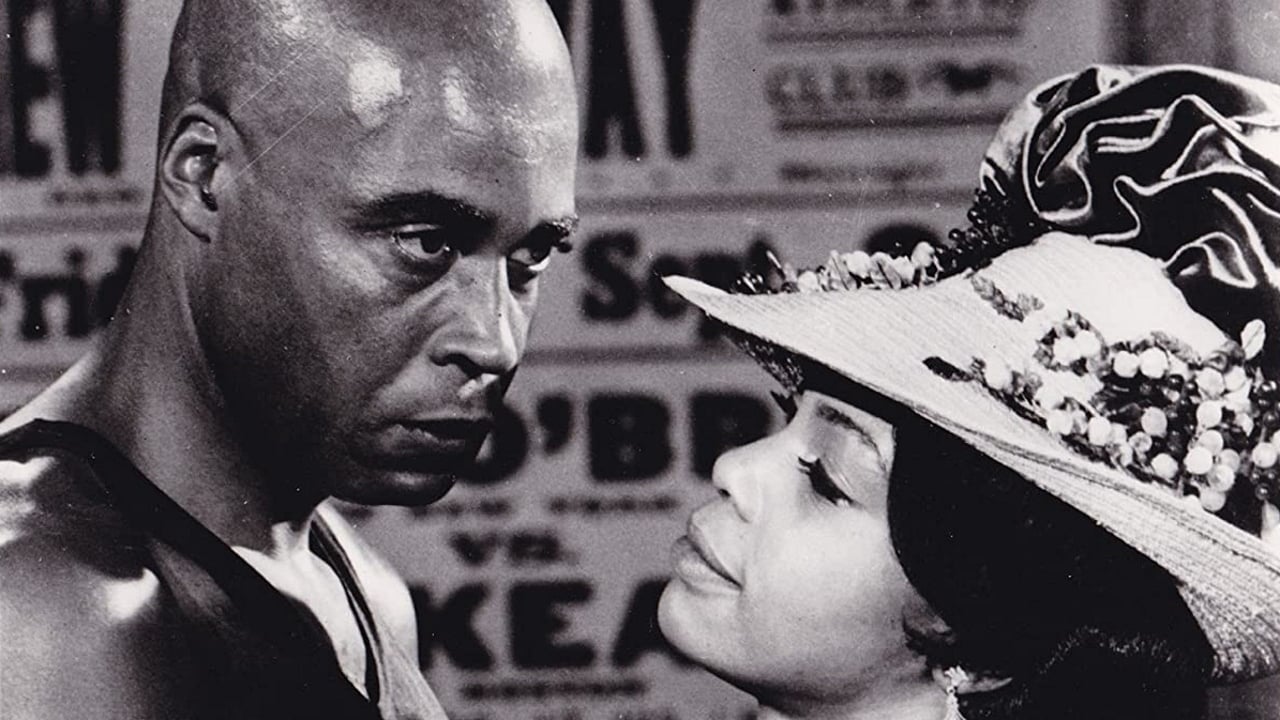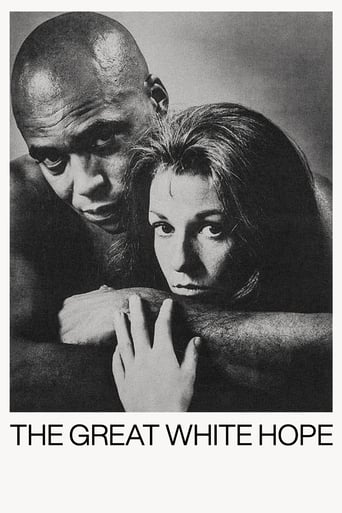

The main attraction of The Great White Hope is James Earl Jones at his peak. His performance as a thinly-disguised Jack Johnson is immediately magnetic, with Jones managing to express all the contradictions of the man himself, coming across as charming and threatening, righteous and vain, all at the same time.The rest of the film isn't half-bad either. It has the telltale signs of a theatrical adaptation, being heavy on the dialogue and light on the action, so those looking for a sports movie will be disappointed. But there's an undeniable pathos to the script and its story of pride and personal morals being worn down by social cynicism. It remains ambiguous what we should think of Johnson and his refusal to compromise with a racist society even as it hurts him and the ones he loves. He's clearly in the right, but -- and so few movies recognize this -- being right only takes you so far. It's a bit dated, but The Great White Hope still raises powerful questions that we're working through today, with an all-time great performance at its core.
... View MoreConcluding reviewing African-Americans in film in chronological order for Black History Month, we're at the near end of 1970 when James Earl Jones reprises his Tony-winning role as boxer Jack Jefferson in film version of The Great White Hope which got him an Oscar nomination. Since this takes place in the early part of the 20th century, he's not very much liked by the majority white public of America at the time certainly whenever he's seen with his Caucasian female partner Eleanor Backman (Jane Alexander, also Academy nominated). His former girlfriend Clara (Marlene Warfield) certainly resents Eleanor for usurping her power over Jack who has no use for her. Good thing he has his manager Goldie (Lou Gilbert) as well as his trainer Tick (Joel Fluellen) on his side so they all go to Europe where they don't have to worry about jail time. I'll just stop there and just say that the staginess is quite evident in many scenes. Still, both Jones and Ms. Alexander are effective whenever they're together whether intimate or arguing. And Fluellen has his biggest role here and makes the most of it. In addition, it was such a treat, after playing husband-and-wife in Guess Who's Coming to Dinner, to see Beah Richards-as Jack's mother-and Roy Glenn-as a pastor at her house-in the same scene again. And seeing Bill Walker-so memorable as Reverend Sykes in To Kill a Mockingbird-playing a deacon in an early scene was also pleasurable to me. One more thing, Hal Holbrook has a memorable turn as an attorney interviewing Ms. Alexander. So on that note, The Great White Hope is highly recommended. Oh, and while this is the official last entry for BHM, there are a few movies I wanted to review in the time alloted that I'm viewing in the next few days (or weeks, depending on my mood) so if you are reading this under my username, watch this space for those reviews...
... View MoreJames Earl Jones's acting was superb and he certainly deserved his Oscar nomination for best actor. Jane Alexander provided a moody portrait of the white Australian woman who loved him deeply but could not cope with him with eventual tragedy occurring for her. Her Oscar nomination for best actress should have been in the supporting category.Other than Jones, the other characters here aren't able to develop. Rather, we have a film here when everything happens too quickly.Beah Richards, as his beloved mother Tiny, is effective but she only appears in one scene in the film. Ditto with the black woman who portrayed his common law wife.It appeared that racism was alive and functioning in England as well when Jones and Alexander went there for his fighting opportunity and to get away from the racist charges that plagued him.The dilemma confronting Jefferson (Jones) regarding whether to throw the fight so that he can get his sentence reduced is never fully worked on in this film which really has some weak writing.
... View MoreI first saw the play at least 35 years ago when it debuted at the Arena Stage in Washington, D.C., with James Earl Jones and Jane Alexander in the lead roles. Recently, Arena revived the play, and I thought it was dated and a dud. But the film, which has just appeared on PBS, reminded me of the power, not so much of the play which has elements of caricature, but of the acting. Jones and Alexander were both outstanding in the movie, Jones as the black heavyweight champion (Jack Johnson in thin disguise)and Alexander as his white lover. The two of them deserved the stardom that came with these roles when the play moved from the Arena Stage to Broadway. It may not even be the best movie about boxing, but it's worth seeing because of Jones and Alexander. Moreover, the virulent racism directed at Jack Jefferson (Jones's character) and the role of the Federal government in prosecuting him under the Mann act are useful reminders of the way our country was at the beginning of the 20th Century. long ago.
... View More